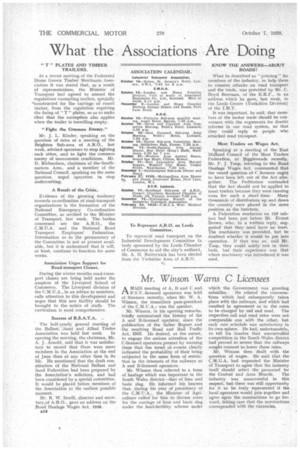Mr. Win son Warns C Licensees
Page 48

If you've noticed an error in this article please click here to report it so we can fix it.
AMASS meeting of A, B and C and. P.S.V.-licensed operators was held at Swansea recently, when Mr. W. A. Winson, the immediate past-president of the C.M.U.A.; was the speaker.
Mr. Willson, in his opening remarks, briefly summarized the history of the A and B-licensed operator, since the publication of the Salter Report and the resulting Road and Rail Traffic Act, 1933. He desired, at the outset, to engage the serious attention of the C-licensed operators present by warning them that the trend of events clearly indicated the probability of their being subjected to the same form of restriction in the interests of the railways as A and B-licensed operators.
Mr. Willson then referred to a form of haulage which was important in the South Wales district—that of lime and basic slag. He informed his hearers that, during his year of presidency of the C.M.U.A., the Minister of Agriculture called for him to discuss rates for the carriage of lime and basic slag under the land-fertility scheme under which the Government was granting
subsidies. He related the conversations which had subsequently taken place with the railways, and which had resulted in agreement as to the rates to be charged by rail and road. The respective rail and road rates were not comparable one with the other, but each rate schedule was satisfactory in its own sphere. He bad, unfortunately, to tell his hearers that uncontrolled competition in the South Wales district had proved so severe that the railways sought consent to lower those rates.
Mr. \Vinson then dealt with the question of wages. He said that the G.M.U.A. had requested the Minister of Transport to agree that the industry itself should select the personnel for the Central and Area Boards. The industry was unsuccessful in this respect, but there was still opportunity for it to be. truly represented if the local operators would join together and agree upon the nominations to go forward, taking care that the nominations corresponded with the vacancies.




















































































